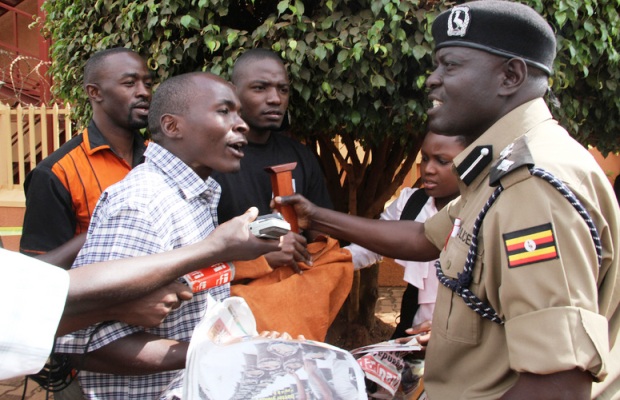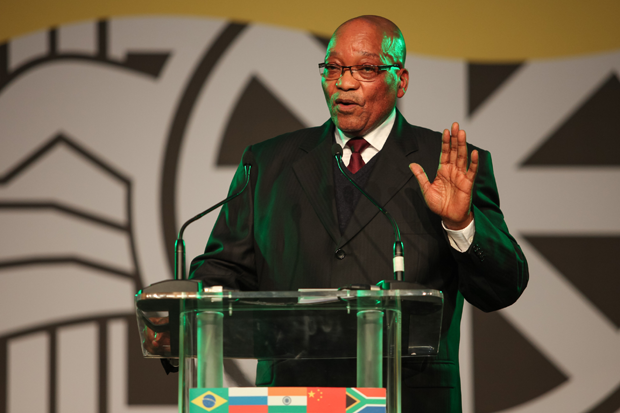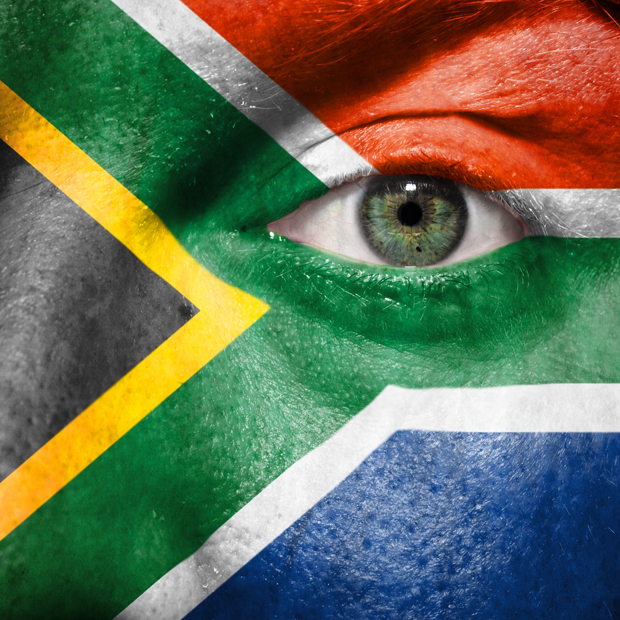22 Oct 2013 | Africa, News, Politics and Society

In June 2013, police and protesters clashed at the offices of the Daily Monitor, Kampala. Picture Isaac Kasamani/Demotix
In the age of technology with high-speed Internet access and smart phones, it is sometimes easy to imagine that all journalists’ working lives are the same: deadlines, insufficient resources, worrying about the threats of digital media and the race to break news.
In some ways these concerns are indeed universal. However, what journalists in North America and Europe hardly ever have to worry about is their basic right to report the news. It is true that in a post-Wikileaks and News of the World journalistic environment, all reporters have had to consider their fundamental role in providing news and information and analysis ethically. However, in Africa many journalists find themselves carefully tiptoeing through minefields of media laws which limit their ability to report accurately and truthfully on the news of the day, particularly when reporting on activities of the powerful in government.
Recently in Swaziland, a journalist has been charged with contempt of court for reporting the fundamental issue of whether or not the Chief Justice is fit to hold office, given that he is the subject of impeachment proceedings back in his own country, Lesotho. Several Zambian journalists were brought to court earlier this year, initially accused of sedition. In Ethiopia, journalists are serving time in prison, sentenced for threatening the state with their reports.
Besides individual actions taken against journalists, whole media enterprises are also at risk. In Tanzania, the two newspapers Mwananchi and Mtanzania have been suspended by the unilateral action of the Minister of Information citing breach of the peace concerns – Mwananchi was reporting on new salary structures in the government. Earlier this year, the newsroom of the Ugandan newspaper Daily Monitor was under siege for over a week, while police was trying to find letters that were exchanged between editors and a source.
There is no doubt that much state action against journalists and media houses is unconstitutional. However, there is also no doubt that Africa’s media laws do make provision for draconian action to be taken against journalists and publications.
The Konrad Adenauer Stiftung’s Media Programme has recently published a two-volume Media Law Handbook for Southern Africa, written by Justine Limpitlaw. The handbook is available for free download on the internet. One of the most important aims of the handbook is simply to provide information about what the law is in a number of southern African countries. Statutes are often not available electronically and many journalists simply have no idea about what the laws governing the media are.
A key characteristic of many southern African countries is a media law landscape with a relatively benign liberal constitution at the apex. All constitutions protect freedom of expression to some extent. However, very few changes have been made to media legislation to ensure that the legislation accords with the constitutional right to freedom of expression. Despite oft-expressed anger at the colonial era and its on-going repercussions for the continent, African political elites have essentially retained colonial era media laws as is.
One only has to list many in-force statutes to note that African media law appears to have stultified in the early or mid-20th century. Both Lesotho’s and Swaziland’s Sedition legislation dates back to 1938. Swaziland’s Cinematograph Act is from 1920. Many countries’ Penal Codes date back to the 1960s – prior to their independence from Colonial powers. These Penal Codes criminalise many forms of expression including defamation, insult and false news, and provide for significant jail sentences.
Sadly few attempts have been made to update African media laws. On the rare occasion where a country has engaged in media law reform, the results have been decidedly mixed. South Africa’s attempt to update apartheid-era security laws has been roundly condemned for promoting governmental secrecy at the expense of the public interest.
There is hope. In 2010, the African Commission on Human and People’s Rights adopted Resolution 169 on Repealing Criminal Defamation Laws in Africa. The resolution calls on states parties to repeal criminal defamation and insult laws which impede freedom of speech. In May 2013, the Pan African Parliament adopted the Midrand Declaration on Press Freedom in Africa. The Pan African Parliament resolved to launch a campaign entitled “Press Freedom for Development and Governance: Need for Reform” in all five regions of Africa. These initiatives by intergovernmental African organisations are historic and represent a real opportunity for media law reform. There is also significant pressure being brought to bear on a number of countries to enact access to information laws.
The objective link between a free press and accelerated development is clear. Sadly governments appear all too willing to forego development in their desire to retain political control. Journalists are under real threat in many countries in Africa and the threats are not only from rogue police officers but also from ordinary police officers and other state functionaries merely carrying out the letter of the law.
The Konrad Adenauer Stiftung believes that the media Law handbook could act as a catalyst for bringing together journalists, media owners, members of the judiciary, government officials and media activists to have a serious look at African media law with a view to taking it out of the colonial era. Together with the Pan African Parliament’s and the Comission’s efforts, this is a great opportunity to make Africa a place where journalists can report the news of the day accurately and fairly without fear of arrest and imprisonment.
This article was originally posted on 22 Oct 2013 at indexoncensorship.org
25 Sep 2013 | Uncategorized
Nelson Mandela’s legacy has been “too easily dismissed”, South African editor Nic Dawes tells Index on Censorship magazine in the latest issue.
In an interview for the magazine, Dawes, who has just left his job as editor at South Africa’s Mail & Guardian for a new job at the Hindustan Times, said: “His legacy is being brought back to us.”
South Africa was going through a phase when the people who brought us press freedom “now seek to restrict it”.
“We are going through a very classical process, what happens when a liberation movement has been in power for a while and starts to see its hegemony challenged and then reaches for a convenient lever to limit that challenge.”
Read the full interview with Nic Dawes in the new issue of Index on Censorship magazine.
Listen to the podcast below or click here.
23 Sep 2013 | News, Politics and Society, South Africa

Jacob Zuma (Photo: Jordi Matas / Demotix)
South Africa’s ruling African National Congress (ANC) has changed tack in its campaign to curtail the media. In a turn to what could be called “censorship lite”, the iron fist of state security intervention is being augmented by the velvet glove of calls for “patriotic” journalism.
After President Jacob Zuma’s ascendancy to the highest position in the ANC in 2007, various attacks have been launched on the private and public media. While factional battles for political control were being fought at the public broadcaster, an investigative journalist was illegally arrested after exposing corruption involving the newly appointed police commissioner. Despite concerted resistance across the social spectrum, the Protection of State Information Bill (dubbed the “Secrecy Bill”) was adopted, which will all but stop whistle blowing and investigate journalism into state corruption. And a media appeals tribunal has been mooted that could mete out punishments ranging from fines to jail time to media houses and individual journalists who offend politicians. While Zuma has referred the Secrecy Bill back to parliament for minor adjustments before signing it into law, the establishment of the tribunal is due to be considered by the country’s parliament, as per a policy decision of the ANC.
In recent times, individuals known to be close to Zuma and the ANC have gained greater influence in the media. This development seems to have precipitated a new softly-softly approach of edging the private media towards news reporting that is more amenable to dominant political interests. Zuma recently made a call for “patriotic journalism” which dovetails with a number of other initiatives by his allies in the media. The public broadcaster and two private media companies have all vowed to shift the media away from reporting on the “opposite of the positive”, as Zuma put it.
Zuma’s call was made in an off-the-cuff address at parliament. He told journalism students that, “When I go out, people envy South Africans, they wish they were South Africans because they say we are doing so well, we are succeeding… they love it. But when I am in South Africa, every morning you feel like you must leave this country because the reporting concentrates on the opposite of the positive.”
He asked the students: “Who do you think in reality you serve when reporting: the interest of the public that you claim, as the media you stand for, or the interest of the owners and managers of the paper? What is it that you think is happening, particularly in a country that is supposed to be an example with vibrant democracy, transparency, high morals, everything. How do we handle this?” Zuma expressed the hope that the South African media would learn from Mexico’s “patriotic journalism” which avoids reporting on crime and rather “markets” the country to foreigners.
His utterances follow a call by the acting chief operating officer of the South African Broadcasting Corporation (SABC), Hlaudi Motsoeneng, that 70% of the public broadcaster’s news reports should be positive. He told the Mail and Guardian that, “we want to concentrate more on positive stories, rather than to put everything in a negative way. Before you become a manager at the SABC, you first have to be a citizen of this country. You should love this country… The message I put out very strongly at the SABC is to think about the positive when people go out and do stories. The difference is our own citizens are tired of crime and tired of people talking about negative things.” Motsoeneng is a known Zuma acolyte who has controversially held onto his post after being dismissed by the previous SABC board.
Meanwhile, businessman Iqbal Survé, who enjoys close ties with the ANC, became the new owner of Independent News & Media, which comprises the largest collection of English-language daily and weekly newspaper titles in the country. He explained part of the rationale for the purchase as being: “We felt the media was not representing the positive aspects of South Africa. What we are reading about is not what we see in South Africa.”
During this same period, Indian business associates and friends of the Zuma family launched ANN7, a new satellite news service. The Gupta family recently provoked outrage for using a military air base near South Africa’s capital Pretoria to fly in guests from India for a private wedding function. The former head of government communications, Jimmy Manyi, hosts a talk show on the channel. Manyi is no stranger to controversy, having spearheaded attacks against the media during his time as government spokesperson, such as using state advertising spending to put pressure on media outlets. In an interview about his new job as talk show host, he declared South Africans to be tired of negative press and that ANN7 will provide an alternative.
ANN7’s broadcasts have been riddled with more than the usual share of start-up problems, leading to much ridicule. The company also had to withdraw a billboard advertisement describing competitors as “old farts”, after a complaint from the South African Older Persons Forum. Postings of “ANN7 bloopers” on YouTube led to a copyright complaint from ANN7 and the removal of the clips, but they can still be viewed elsewhere.
The mirth that greeted ANN7 was also evident in responses to Zuma’s call, both in articles and tweets. More serious critiques included an article from Media Monitoring Africa, while others pointed out that Mexico has one of the worst press freedom records in the world.
Thus far, velvet glove of censorship lite has not succeeded in massaging the established private media into a more “patriotic” stance. This may change when the iron fist of criminalisation of critical journalism finally comes crashing down.
This article was originally posted on 23 Sept 2013 at indexoncensorship.org
7 Aug 2013 | Africa, Digital Freedom, Index Reports, News, Politics and Society, Religion and Culture, South Africa

(Photo illustration: Shutterstock)
Though the shackles of apartheid and the public role of Nelson Mandela have faded, South Africa is confronting questions about government surveillance in the digital era, media regulation and artistic censorship.
Apartheid in South Africa (1948-1994) was partially kept in place with restrictions on the flow of information. The state attempted to draw a veil of secrecy over the intensification of repression through detention without trial, house arrests and the torture and killing of opponents from the 1960s onwards. Music and literature were among the modes of anti-apartheid resistance from the 1960s onwards. Literature and music supportive of political opposition or that was deemed sexually permissive was banned. Some journalists, authors and musicians left the country to escape prosecution while many who stayed were persecuted. Television was only allowed in the country in the mid-1970s and only when the then ruling National Party was convinced it could control the medium.
The transition to democracy in the 1990s under Mandela marked a radical departure, with openness and transparency declared primary aims. Clause 16 of the Bill of Rights in the South African Constitution of 1996 guarantees that “everyone has the right to freedom of expression, which includes freedom of the press and other media; freedom to receive or impart information or ideas; freedom of artistic creativity; and academic freedom and freedom of scientific research.” However, this right is not absolute. The same clause warns that it “does not extend to propaganda for war, incitement of imminent violence; or advocacy of hatred that is based on race, ethnicity, gender or religion, and that constitutes incitement to cause harm.” Clause 14 (d) of the Bill of Rights safeguards the right to privacy, including the right not to have the privacy of communications infringed.
South Africa’s adoption of the right to freedom of expression in its Constitution is reflected in a lively national debate as democracy takes root. However, as pundits claim the space to hold to account the government and, less frequently, business, the past five years have seen worrying moves against free expression. These range from verbal threats to legislative measures to the irregular arrest of a journalist. Protesters have also targeted journalists at community-level demonstrations about socio-economic rights.
Media Freedom
Four large corporations dominate South Africa’s print media sector, which limits diversity in opinion. While the sector has been battling plunging circulation figures, as elsewhere in the world, it has still managed to invest in investigative journalism, which remains vibrant. Art and related types of journalism have however suffered from a lack of resources. The media stand at the centre of vehement political debates in the country, with newspaper leaks common in the infighting between factions of the ruling African National Congress (ANC). The combination of political and investigative exposures has led to ANC threats of appointing a “media tribunal” to replace the system of self-regulation. In response, the media funded a public consultation process, and a new system has been instituted which remains self-regulatory but includes more mechanisms to allow greater accountability of the press to the public. However, the ANC has decided that the country’s parliament should still investigate the creation of a media tribunal “that is empowered to impose sanctions without the loss of any constitutional rights”.
The Protection of State Information Bill was adopted by parliament this year, despite concerted resistance from a wide range of organisations and individuals. The bill, driven by state security agencies, is expected to undermine access to state information and inhibit investigative journalism. Revisions did not address its draconian penalties of up to 25 years or the overly narrow scope of its belatedly included public interest clause. In a significant improvement, however, the bill no longer overrides the Protection of Access to Information Act or the Protected Disclosures Act, both passed in 2000.
Recent changes in print media ownership have seen the Independent Newspapers (former Argus) group returned by the Irish company Independent News and Media (INM) to South African control. While INM is generally regarded as having “harvested” the Independent Newspapers and thereby stunting its growth in South Africa, the acquisition by Sekunjalo has raised concerns about political control as business allies of the ruling party are involved in the deal.
Most South Africans remain dependent on television and especially radio for information. The state-owned South African Broadcasting Corporation (SABC) remains the dominant TV and radio outlet with its programming in all 11 languages. However, the SABC has been riddled with management battles and repeated allegations of political interference, which included the blacklisting of commentators critical of the government.
Digital Freedom
After a good start in the 1990s when Internet use was commercialised in South Africa, tardy and expensive broadband has slowed connectivity. Recent research suggests that 39 percent of adults, or 14 million people, access the Internet at least once a week. Another study found that a relatively high percentage of South Africans use mobile phone services (66 percent). According to the 2011 government census, half of those who use the Internet use their mobiles to do so, as only about 23 percent of households have a computer at home. Internet service providers believe this number would be higher if mobile broadband prices were more competitive. While mobile broadband is more affordable and faster than fixed-line services, prepaid mobile customers pay more than contract customers, which means poorer people have less access.
Regarding government measures, the Regulation of Interception of Communications and Provision of Communication-Related Information Act of 2002 (RICA) requires service providers to record and keep customer information, which can be requested by government agencies. The act disallows interception of communication, subject to judicial approval. Similarly, a judge has to grant permission before government agencies can access mobile phone records.
The Right2Know (R2K) civil society campaign in 2012 mobilised against the General Intelligence Laws Amendment Bill, which would have empowered state-security operatives to monitor e-mails and social media communication without permission from a judge. While this expansion of powers was avoided, R2K pointed out that the final version of the bill still did not provide clarity regarding the monitoring of electronic communication passing through a foreign server. The Mail and Guardian newspaper has reported on the illegal bugging of private citizens’ communication. Security agencies’ illegal monitoring of communications has become a weapon between factions in the ruling party. In the most notorious case, the ascendancy of the current president, Jacob Zuma, to the highest office was clinched with the withdrawal of corruption charges against him on the basis of “spy tapes”. These recordings, seemingly illegally made, allegedly showed a political plot against Zuma that involved the National Prosecuting Authority. Interceptions by the police’s crime intelligence divisions rose sharply between 2009 and 2010, including illegal bugging that led to the recent resignation of the head of the South African Revenue Services for attempting to recruit someone in return for sexual favours. Meanwhile, the implications are unclear of the National Cyber Security Policy that the ANC wants the government to adopt by 2014 to prevent the distribution of “harmful and anti-social” content.
Artistic Freedom
Artists have enjoyed unprecedented freedom to be creative in South Africa since the transition to democracy. However, political tensions have risen about art seen as ridiculing Zuma. In 2012, Brett Murray’s painting called “The Spear” was exhibited at a Johannesburg art gallery, depicting Zuma in a well-known pose of Communist leader Vladimir Lenin but with his genitals exposed. ANC leaders pressurised the gallery by leading a march of ANC supporters to its doors. Two men defaced the painting while on display.
An amendment in 2009 to the Film and Publications Act of 1996 that every unregistered print and online publication that contains sexual content be submitted for classification by the Film and Publications Board has since been declared unconstitutional by the High Court. The Constitutional Court still has to confirm the High Court’s decision. The board has been skittish about films depicting teenagers in sexual situations, whether consensual or forced. In 2008 it banned the Argentinian film “XXY” and this year it banned the South African film “Of Good Report” on the basis of being “child pornography”. Both bans have since been overturned.
This article was originally published on 7 Aug, 2013 at indexoncensorship.org. Index on Censorship: The voice of free expression




